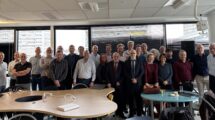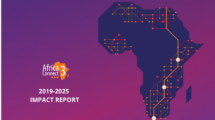Submitted by Ana Afonso, FCCN
The dissemination of the COVID-19 pandemic in Portugal was quick and in early March forced us all to take measures and create quick responses such as the implementation of teleworking and distance learning. These measures were considered essential in this challenging phase, since preventing the spread of the virus became an obvious priority.
Since 16 March, most of FCCN’s staff adopted telework. Therefore the access to all physical infrastructures was restricted. Most of the work platforms are now accessed using VPN (Virtual Private Network) technology.
Just like FCCN, the institutions part of the Portuguese academic and research system had to oblige with contingency plans and abide with the social distancing rules.
In this scenario, the importance of the services delivered by the Portuguese NREN, FCCN, became more evident. FCCN strengthened its capacity to support digital services. Teams were committed to provide full support to the community, providing the platforms and connectivity necessary to work remotely.
There was a significant growth in the use of the collaborative platforms delivered by FCCN. Higher education and research entities are using them and adopting collaborative work environments, and in that way ensuring the maintenance of their academic and research activities.
In the context of distance learning we would like to especially highlight Colibri, – our videoconference service. Its usage growth was quick to reach 2800%. The average usage, before this exceptional period, was of 124 daily meetings and 827 overall users. On March 16th, 2.698 meetings and 63.181 users were registered in a single day. On 24 April, 13.216 meetings were held, and 280.616 participants were registered. This web collaboration service provides the possibility to hold videoconferencing sessions with a capacity of 300 participants per session. Audio, video, text, images, whiteboard and screen sharing are also available. The sessions can also be recorded to the cloud and later uploaded to the Educast service.
To match this great demand in collaborative work environments the RCTS (Science, Technology and Society Network) connection was strengthened. RCTS began to develop two operations:
The first operation consisted on an upgrade in the connection of the RCTS to Gigapix – the national Internet Exchange Point. This upgrade – to 100Gbps – aimed to guarantee the quality of the academic network’s connection to telecommunications operators and to the major content providers present in Gigapix.
Secondly, there was an upgrade in the access from the Azores, Madeira and Algarve Universities, which resulted in an increase of 344% in the access rate to RCTS. FCCN also offers a range of platforms such as Videocast, Educast, NAU and Filesender, which make the task of distance working much easier. All of these services have increased their usage rate, as can been seen here : https://www.fccn.pt/en/statistics/
FCCN also created all the tech info, necessary to kick off the eduVPN offer for the Portuguese higher education entities who still have not found the right VPN solution. eduVPN is a VPN service provided for the international research and education community, aiming to offer both secure access to campus networks as well as the ability to be safer when using the Internet.
Other initiatives
The need to massively apply distance learning methods motived the existence of a “COVID19 Distance Learning Observatory”. The mission of this initiative is supporting higher education institutions, their teachers and students, is prompt a continuous monitoring of the implementation of distance learning / teaching activities in response to learning in social isolation.
It is intended that the “COVID19 Distance Learning Observatory” be implemented in a phased and evolutionary way, namely in terms of technological solutions capable of gradually improving the quality of distance teaching / learning processes and the exchange of experiences between teachers and students, as well as student assessment. In addition, this platform may be seen as an instrument for collecting information for the purpose of research on methodologies and practices of distance learning / teaching by the scientific community.
As COVID-19 imposes social and professional constraints, causing significant changes in the lives of the entire population and shifting most activities online, FCT helped creating a new project to reach out to the Portuguese population with less digital knowledge.
Those who did not have the opportunity to improve their basic digital skills could be now even more isolated and perhaps more vulnerable.
The “Somos todo@s digitais” (we’re all digital) project, is a voice line aimed to help the Portuguese population with less digital literacy and translates in providing support for safe and responsible use of digital solutions for communication and access to services at a distance.
A portal named Sciende 4 Covid was implemented to mobilize the scientific communities in joint Research and Development (R&D) projects and activities aimed at combating COVID-19. In line with the National Directorate of Health (DGS) National Preparedness and Response to Disease Plan, as well as with the strategies of other European and international health authorities, a joint initiative from FCT and the Agency for Clinical Research and Biomedical Innovation (AICIB), in partnership with public and private health authorities and scientific research institutions was set up. The portal groups metadata, datasets or links, problem registration, research results in epidemiological surveillance and other anonymous public health data necessary to combat the coronavirus epidemic, such as clinical, analytical and demographic results.
Two calls for science projects were launched for special support for rapid implementation projects for innovative response solutions to COVID-19 pandemic. The call “Research 4 covid” has already granted funding for 66 projects and the second call is ongoing until 15, May.
FCCN also started to use its own version of the #StayAtHome hashtag and through our channels on social media networks – Facebook, Twitter and LinkedIN – we have encouraged our community to share their experience with the work tools and support services provided. The sharing of good use cases of our platforms and services was also encouraged, so that together we can better overcome this phase, and any user can adopt good usage tips, keeping the good spirit flowing and activities going in this atypical period.
Media Coverage
Throughout this period the R&E community have received large amounts of positive media coverage for our activities:
Coronavirus. Portugal records record amount of internet traffic – https://rr.sapo.pt/2020/03/18/pais/coronavirus-portugal-regista-valor-recorde-de-trafego-na-internet/noticia/185833/
Algarve University advances for the future through FCCN upgrade and distance teaching – https://www.avozdoalgarve.pt/d/ualg-avana-para-o-futuro-atravs-de-ensino-a-distncia-e-teletrabalho-com-upgrade-da-fccn/43407
COVID-19: FCCN offers several platforms for distance learning – https://pplware.sapo.pt/software/covid-19-fccn-disponibiliza-varias-plataformas-para-ensino-a-distancia/
FCCN-FCT distance learning service users increased by over 2800% – https://www.publico.pt/2020/03/14/ciencia/noticia/utilizadores-servico-ensino-distancia-fccn-aumentaram-2800-1907726
How to use the FCCN’s Colibri for distance learning – https://pplware.sapo.pt/internet/como-usar-o-colibri-da-fccn-para-ensino-a-distancia/
Covid-19: Distance learning platform in higher education with 63 thousand users in one day –http://portocanal.sapo.pt/noticia/213332
COVID-19: FCCN-FCT reinforces distance learning and telework services – https://www.pcguia.pt/2020/03/covid-19-fccn-fct-teletrabalho/
COLIBRI: Online distance learning platform with more than 63,000 users in one day https://tek.sapo.pt/noticias/internet/artigos/colibri-plataforma-online-de-ensino-a-distancia-com-mais-de-63-000-utilizadores-num-so-dia







